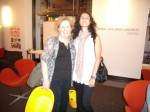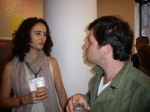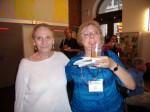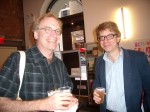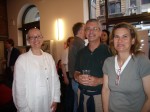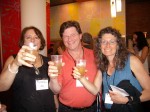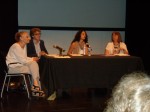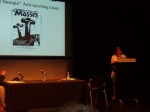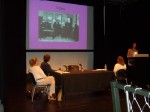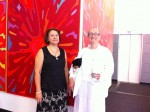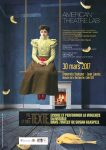 Seminar on Trifles organized by Emeline Jouve & Céline Nogueira at Toulouse University (France) on March 30, 2017. Guest of Honor: Noelia Hernando-Real, President of the International Susan Glaspell Society”
Seminar on Trifles organized by Emeline Jouve & Céline Nogueira at Toulouse University (France) on March 30, 2017. Guest of Honor: Noelia Hernando-Real, President of the International Susan Glaspell Society”
Category Archives: Conferences
“Trifles at 100” at the Metropolitan Playhouse and Modern Drama Seminars, 2016
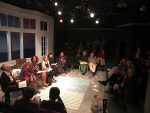
(l. to r.) J. Ellen Gainor, Barbara Ozieblo, Noelia Hernando-Real, Cheryl Black, Emeline Jouve and Sharon Friedman answer audience questions at the Metropolitan “Trifles at 100” concert reading.
A professional concert reading of Trifles was presented on October 4, 2016, at the Metropolitan Playhouse, 220 East 4th St., New York City, organized by AD Alex Roe and ISGS members Sharon Friedman and J. Ellen Gainor, to celebrate the centennial of Trifles. ISGS members participated in a post-reading discussion at this moving tribute to Glaspell’s most iconic play.
On October 16, 2016, a Modern Drama Seminar on Susan Glaspell and the Provincetown Players was held at Universidad Autónoma de Madrid with keynote speakers Basia Ozieblo, Emeline Jouve and Linda Ben-Zvi. The Seminar included an exhibit at the Humanities Library: “Susan Glaspell, pionera del teatro experimental.” Another special Seminar was held in Toulouse, France on invisible violence in Trifles with keynote by guest of honor Noelia Hernando-Real. The Seminar was organized by Emeline Jouve & Céline Nogueira at Toulouse University (France).
Provincetown Players Centennial 2015
 July 9-12, 2015 in Provincetown, MA, a centennial conference sponsored jointly by the Eugene O’Neill Society and the International Susan Glaspell Society returned to the scene where Glaspell’s and O’Neill’s first plays were read on the wharf in Provincetown on July 15, 1915. This four-day celebration included walking tours, performances at the Provincetown Theatre, roundtables, a gala reception, fish-house punch, and more! Roundtables included: “Intertextualities in Works by Women Playwrights of the Provincetown Players,” chaired by Martha C. Carpentier; “Jig, Susan, and Gene: The Triumvirate that Shaped the Provincetown Players,” chaired by Linda Ben-Zvi, plus a wonderful guided walking tour hosted by O’Neill Society President, Jeffrey Kennedy.
July 9-12, 2015 in Provincetown, MA, a centennial conference sponsored jointly by the Eugene O’Neill Society and the International Susan Glaspell Society returned to the scene where Glaspell’s and O’Neill’s first plays were read on the wharf in Provincetown on July 15, 1915. This four-day celebration included walking tours, performances at the Provincetown Theatre, roundtables, a gala reception, fish-house punch, and more! Roundtables included: “Intertextualities in Works by Women Playwrights of the Provincetown Players,” chaired by Martha C. Carpentier; “Jig, Susan, and Gene: The Triumvirate that Shaped the Provincetown Players,” chaired by Linda Ben-Zvi, plus a wonderful guided walking tour hosted by O’Neill Society President, Jeffrey Kennedy.
Schedule of Events:
Friday, July 10 — AM: A walking tour of Provincetown and the east end P’town Players’ sites, followed by “Women Playwrights of the Provincetown” roundtable. PM: Celebration of the first night of Players’ readings, with fish-house punch, on the beach!
Saturday, July 11 — AM: Tour of P’town Museum, followed by “Jig, Susan, and Gene” roundtable at the P’town Library. PM: Performances of Supressed Desires, Constancy, Trifles, and The Sniper at the Provincetown Theatre (ticket costs included at great discount in conference fee!), followed by a panel with Robert M. Dowling, Linda Ben-Zvi, and Jeff Kennedy, moderated by Susan Rand Brown. Gala reception to conclude festivities!
Sunday, July 12 — AM: Conference ended with a brunch that honored our two societies and all that our members have accomplished, followed by a book talk by Robert M. Dowling, author of the new biography, O’Neill: A Life in Four Acts, recently chosen by the Los Angeles Times as Book Prize finalist.
French Society of Modernist Studies Inaugural Conference 2014
 “‘My Beloved Community’: The Provincetown Players and Modernist Drama in the United States” is the title of the panel presented by ISGS members at the inaugural international conference of the French Society of Modernist Studies, entitled Modernist Communities, on April 25-26, 2014, at the University of the Sorbonne Nouvelle, Paris, France. Emeline Jouve (Toulouse 2) chairs the panel which features the following papers:
“‘My Beloved Community’: The Provincetown Players and Modernist Drama in the United States” is the title of the panel presented by ISGS members at the inaugural international conference of the French Society of Modernist Studies, entitled Modernist Communities, on April 25-26, 2014, at the University of the Sorbonne Nouvelle, Paris, France. Emeline Jouve (Toulouse 2) chairs the panel which features the following papers:
Jeff Kennedy (Arizona State University): “George Cram Cook’s ‘Beloved Community of Life-Givers’: The Provincetown Players as Communal Experiment”
Drew Eisenhauer (Meaux): “Modernism, Expressionism, and the Avant-Garde: The Provincetown Players and the Birth of Formal Experimentation in the American Theatre”
Beth Wynstra (Babson College): “‘I Must Be a Mere Protective Animal’: The Modern Marriage in the Works of the Provincetown Players”
Noelia Hernando-Real (Universidad Autonoma de Madrid): “The First World War in Europe and in America: War Plays by Women Modernist Playwrights of the Provincetown Players”
The aim of this two-day conference is to foster discussion on communities in the modernist period as discursive constructs and historical practices. More than a decade after the landmark work of Jessica Berman (who is to deliver one of the keynote addresses) on “the politics of community” in modernist fiction, this conference explores the various ways in which communities were configured across genres and artistic media, while acknowledging the grounds of their historical and cultural specificity. By presenting far-ranging approaches to the concepts, forms, and historical practices of community, the goal of this conference is to map out the plurality of this phenomenon, while recording its persisting elusiveness. One of the premiere modernist communities, the Provincetown Players of course had to be represented and the joint members of the International Susan Glaspell and Eugene O’Neill Societies rose to the challenge.
With this conference the French Society of Modernist Studies — Société d’Etudes Modernistes — hopes to bring together scholars from all countries and strengthen collaborations between French and international researchers. We also hope this event marks the beginning of continuing collaboration between our groups. Congratulations to our panel presenters and chair for representing us so well.
24th Annual American Literature Association Conference 2013
 “The Theater of Engagement: The Provincetown Players and the Great War”
“The Theater of Engagement: The Provincetown Players and the Great War”
Chaired and organized by Sharon Friedman, Gallatin School, NYU
In their interdisciplinary study 1915: The Cultural Moment, Adele Heller and Lois Rudnick observe that progressive groups in New York’s Greenwich Village devoted to creating “a millennium of social peace and justice on American shores, faced the paralyzing horror of the Great War, now entering its second of four years.” Many involved in the Provincetown Players, one of the most important cultural institutions of the Village during this period, along with the radical faction of the Liberal Club, the revolutionary publication The Masses, and the discussion group Heterodoxy, were haunted by the war in Europe and the growing involvement of the United States, the imposition of the draft law, the persecution of dissenters, the Espionage and Sedition Acts, and ultimately the “Red Scare.” Among the diverse stylistically and thematically avante garde works produced by the Players are plays that give dramatic voice to the war issues debated among these and other groups during this period.
This panel includes papers that bring a historical, cultural, and textual analysis to, for example, Eugene O’Neill’s The Sniper (1915), Rita Leo’s (Wellman) The Horrors of War (1915), Edna St. Vincent Millay’s Aria de Capo (1918), or Susan Glaspell’s Inheritors (1921). The papers discern a dialogue between the drama and essays, magazine articles, treatises, manifestos, political rally documents, autobiographical writing or fiction generated by such groups and figures.
Papers presented include:
1. “‘The War Bill’: War on the Stage of the Provincetown Players,” Jeffery Kennedy, Arizona State
University
2. “WWI, Gender Politics, and the Stage as Pulpit: (Anti)War Plays by Women of the Provincetown and
Commercial Theatre,” Pam Cobrin, Barnard College
3. “‘The Gesture’ of Protest: Susan Glaspell and American Idealism in 1917,” Martha C. Carpentier,
Seton Hall University
4. “‘The Play is the Thing’: Feminist (Meta)theatre of Engagement” in Edna St. Vincent Millay’s War Play
Aria da Capo,” Noelia Hernando-Real, Universidad Complutense de Madrid
4th International Conference on American Drama and Theater
 May 28-30, 2012, Seville, Spain. Noelia Hernando-Real chaired the International Susan Glaspell Society panel, featuring the following papers: “Nora in America: Ibsen’s A Doll House as Intertext within a Tradition of Feminist Bildungsdrama in Plays by Eulalie Spence, Dawn Powell, Rachel Crothers, and Susan Glaspell” by Cheryl Black, University of Missouri, USA; “Why Do We Three Go Apart?: Love, The Mind-Body Problem, and Trajectories in Glaspell’s Oeuvre” by Michael Winetsky, CUNY, USA; “Some Challenges in Translating Suppressed Desires into Spanish” by Nieves Alberola Crespo, Jaume I University, Castellón, Spain. A large contingent of Glaspellians attended this conference hosted by the University of Seville in beautiful Andalucia, Spain!
May 28-30, 2012, Seville, Spain. Noelia Hernando-Real chaired the International Susan Glaspell Society panel, featuring the following papers: “Nora in America: Ibsen’s A Doll House as Intertext within a Tradition of Feminist Bildungsdrama in Plays by Eulalie Spence, Dawn Powell, Rachel Crothers, and Susan Glaspell” by Cheryl Black, University of Missouri, USA; “Why Do We Three Go Apart?: Love, The Mind-Body Problem, and Trajectories in Glaspell’s Oeuvre” by Michael Winetsky, CUNY, USA; “Some Challenges in Translating Suppressed Desires into Spanish” by Nieves Alberola Crespo, Jaume I University, Castellón, Spain. A large contingent of Glaspellians attended this conference hosted by the University of Seville in beautiful Andalucia, Spain!
Eugene O’Neill Society 8th International Conference 2011
“O’Neill in Bohemia,” June 22-26, Greenwich Village, NY. The Susan Glaspell Society was once again pleased to be participating in the International Eugene O’Neill Conference with a full day of events on Saturday, June 25, 2011.
12:00 —SGS Business Meeting in Dean’s Conference Room, Gallatin Building, 1 Washington Place. Meeting minutes are posted.
2:00—Panel: “‘The Beloved Community’: The Provincetown Players in Context,”in Jerry H. Labowitz Theatre, 1 Washington Place @ Broadway. Chair and organizer: Sharon Friedman, the Gallatin School, New York University.
Recent scholarship on Susan Glaspell and other writers and artists of the Provincetown experiment has probed and deconstructed the by now mythical narratives of its founding and evolution to provide a more historicized and intertextual analysis of the Players and the plays. These studies situate the group at an important historical moment—the development of socialism, feminism, psychoanalysis, modernism, and the emergence of global warfare—and reveal shared stylistic and thematic concerns as well as their profound connections to other writers, cultural institutions, ideologies, discourses, and events of the period. Presentations will build on this research to explore the synergies between plays produced by the Provincetown (1916-1922) and writings produced by Village institutions, such as the Washington Square Players, the Liberal Club, The Masses, and Heterodoxy, with which they shared members, ideals, and a range of responses to events and conditions of this period.
Papers: “Oligarchy of the Artists: Jig Cook, Greenwich Village, and American Cultural Identity,” Drew Eisenhauer, Mayor of Paris Research Fellow, University of Paris, Diderot;
“A Luncheon for Suffrage: Theatrical Contributions of Heterodoxy to the Enfranchisement of the American Woman,” Noelia Hernando-Real, Universidad Complutense de Madrid;
“Staging Bohemia: Theatrical Self-Representation in Greenwich Village,” Brenda Murphy, Board of Trustees Distinguished Professor of English, University of Connecticut.
3:45—“Performing Bohemia”: A Concert Reading by Susan Glaspell Society members along with professional actors, adapted and assembled by Cheryl Black (University of Missouri) from Glaspell’s “The People,” the pages of the socialist journal The Masses, and sundry songs, poems, speeches, and manifestoes from the pens of the Provincetown Players and their Village cohorts, presented in the Jerry H. Labowitz Theatre. For photos of this event, follow the link to O’Neillian Win Goodbody’s gallery from “Links” page.
5:30—SGS Provincetown Punch Reception. We toasted “The Beloved Community” with their “Fish House” punch from the recipe preserved by Provincetown executive committee member Edna Kenton. The Players’ potent potable combines two kinds of brandy, rum, black tea, sugar, lemon juice, and ice, and was served to Glaspellians and O’Neillians in the gallery space adjacent to the Jerry Labowitz Theatre.
- Sherry Engle and Noelia Hernando-Real
- Noelia and Michael Winetsky
- Sharon and Judi Barlow pay tribute to Jig’s elixir
- Drew Eisenhauer enjoys the punch with Kurt Eisen
- J. Ellen Gainor with Jan Balakian
- Martha Carpentier and Steve Bloom toast
- The panel fields questions from the audience. From left to right: Sharon Friedman, Drew Eisenhauer, Noelia Hernando-Real, and Brenda Murphy
- Brenda Murphy presents on SGS panel
- Noelia presents
- Martha and Ellen
22nd Annual American Literature Association Conference 2011
May 26-29, Boston MA.
Panel: “Dramatizing Ideas: Hybrids, Heterodoxies, and Humanisms in Greenwich Village.”
Chair: Michael Winetsky.
The Glaspell Society is pleased to present its panel as part of the Five Dramatists Societies’ series of associated panels at ALA 2011 on “Dramatizing Ideas.” Selecting for traits, cross breeding, grafting, Claire Archer, the horticultural mad scientist at the center of Glaspell’s 1921 drama The Verge, uses all of these techniques to create a new self-reproducing species of plant, calling her efforts “mad new comings together.” In imagining Claire’s work in this play, Glaspell hit upon a metaphor for the intellectual life of Greenwich Village, where new ideas in politics, philosophy, science, spirituality, and art were bred and crossbred. Glaspell’s horticultural metaphors for ideas have been linked by recent scholars to the educational organicism of John Dewey, to the Pragmatism of William James, to the Humanism of F. C. S. Schiller, to the psychoanalytic theories of Sigmund Freud, to the ontology of Henri Bergson, as well as to the evolutionary science of Lamarck, Darwin, and Haeckel. Such metaphors must be seen as the culmination of Glaspell’s own long-standing interest in the fusion of different ways of knowing. “When art weds science,” Glaspell wrote in her first novel, The Glory of the Conquered, “the resulting library is difficult to manage.” Extending these metaphors into a more general inquiry, the Susan Glaspell Society invites papers that address Greenwich Village as a site for the transformation of ideas.
Papers: “Loving Outside the Law: Nature as Mother in Susan Glaspell and Mary Hallock Foote,” Catherine Q. Forsa, Seton Hall University;
“Jung’s Impact on the First Greenwich Village Avant-Garde,” Dr. Jay Sherry, independent scholar;
“‘What is that?’: Epistemological Crises in Glaspell’s Trifles and The Morning is Near Us,” Taryn Norman, University of Tennessee, Knoxville.
International Conference on American Drama 2010
Oct. 29-30, Kean University, Union NJ.
Panel: “The Significance of Susan Glaspell to American Drama and Performance.”
Chair: Linda Ben-Zvi, Professor Emeritus, Tel Aviv University.
Papers: “Re-Visiting Bernice in the 21st Century,” Sharon Friedman, Gallatin School of New York University;
“Gender Identity in Susan Glaspell’s and Marsha Norman’s Plays”, Noelia Hernando-Real, Universidad Complutense de Madrid;
“Searching for the Voice of Minnie Wright in Trifles,” a dramatic monologue written and performed by Milbre Burch, University of Missouri.
In addition, a staged reading of Chains of Dew was presented by SGS members and professional actors, adapted and directed by Cheryl Black, University of Missouri.
Association of Theatre in Higher Education Conference 2010
Aug. 3-6, Los Angeles.
SGS/ATDS sponsored panel: “Surviving The Outside: Modernity and the Woman Artist.”
Chair: Monica Stufft, University of California at Berkeley.
This ATDS focus group panel involved Susan Glaspell Society members and featured a reading and discussion of Glaspell’s play, The Outside. A deeply symbolic one-act set at an abandoned life-saving station, the play focuses on two women who have virtually exiled themselves. In the play, male characters attempt and fail to resuscitate a drowning victim while the two women living at the life-saving station struggle with their decision to remain isolated from the rest of society. Allie Mayo “has not spoken an unnecessary word for twenty years” after the death of her husband while Mrs. Patrick has elected to be emotionally and physically distanced from others after the infidelity of her husband. Our reading (with a run-time of approximately 30 minutes) and discussion explored the significance of what Veronica Makowsky has called “two aspiring, but temporarily stymied, female modernist artists-in-life.” We considered the implications of Glaspell’s presentation of a highly gendered view of modernism or modernisms in The Outside. In particular, we addressed Glaspell’s suggestion that the woman artist cannot survive if she disconnects herself from society or from her past in order to consider the play’s implications for theatre today.




